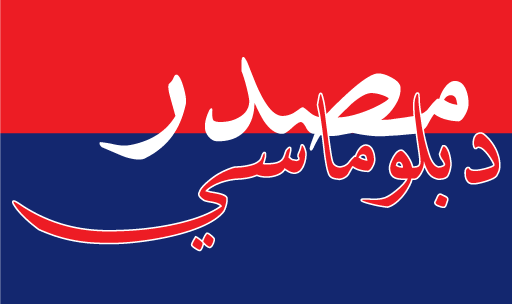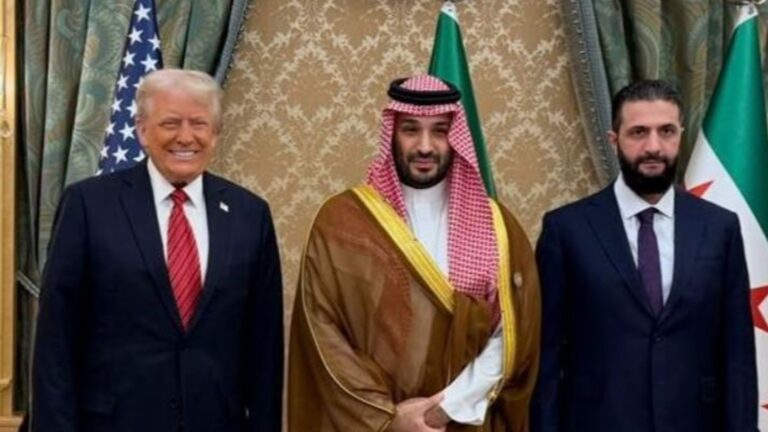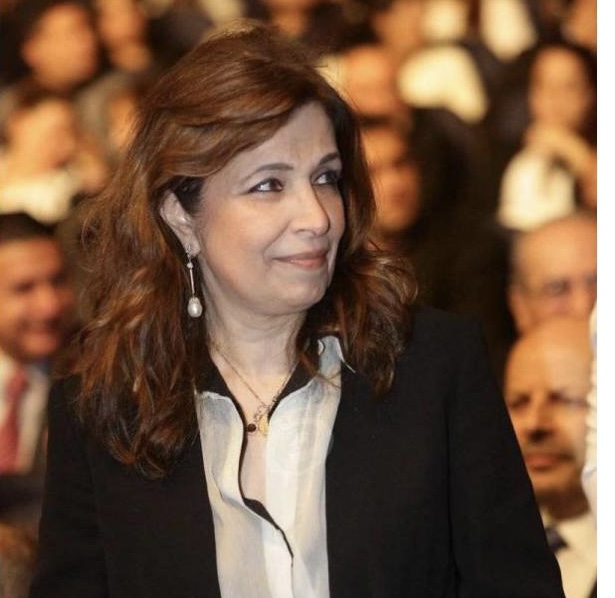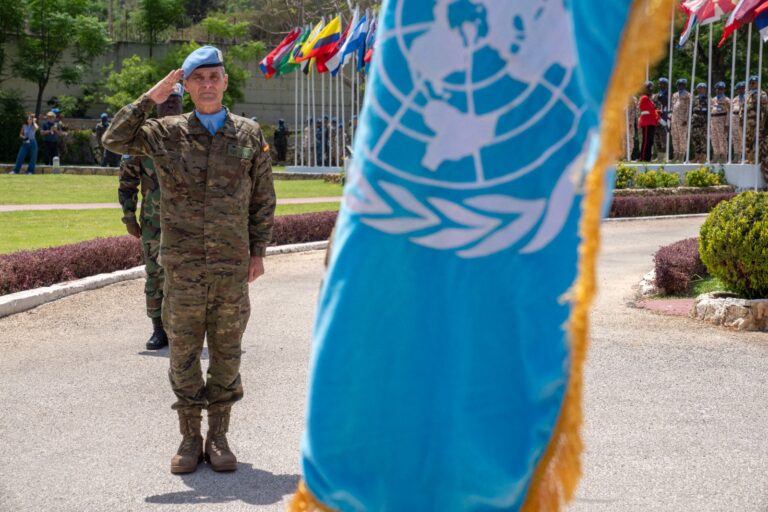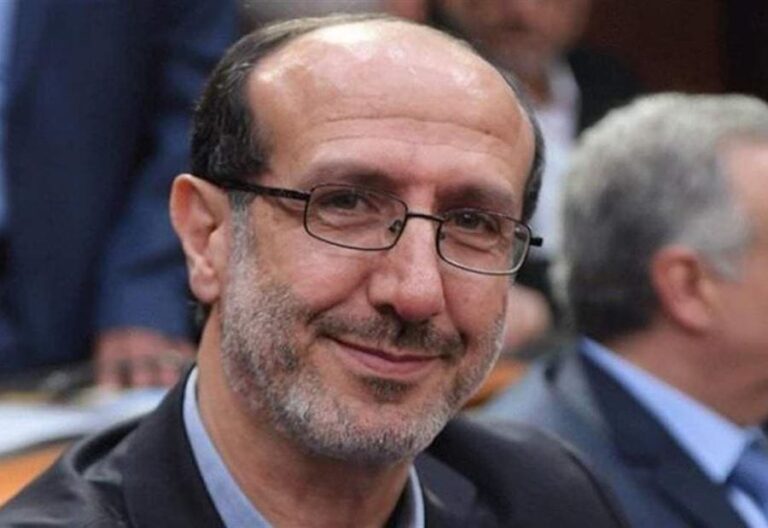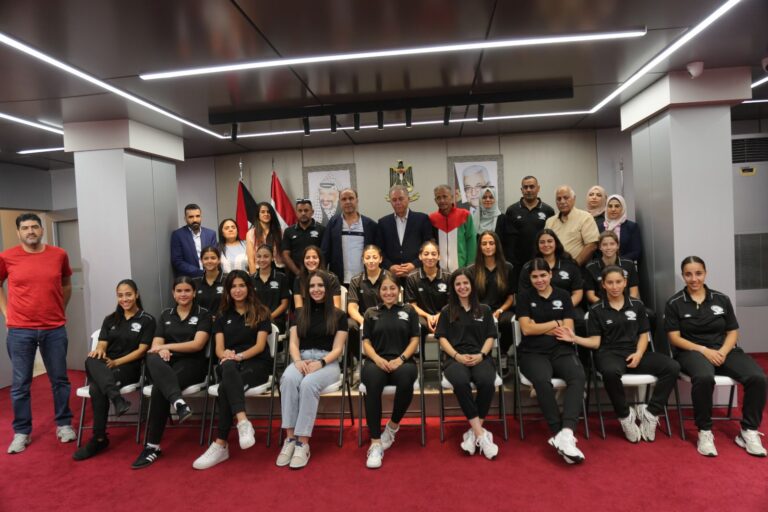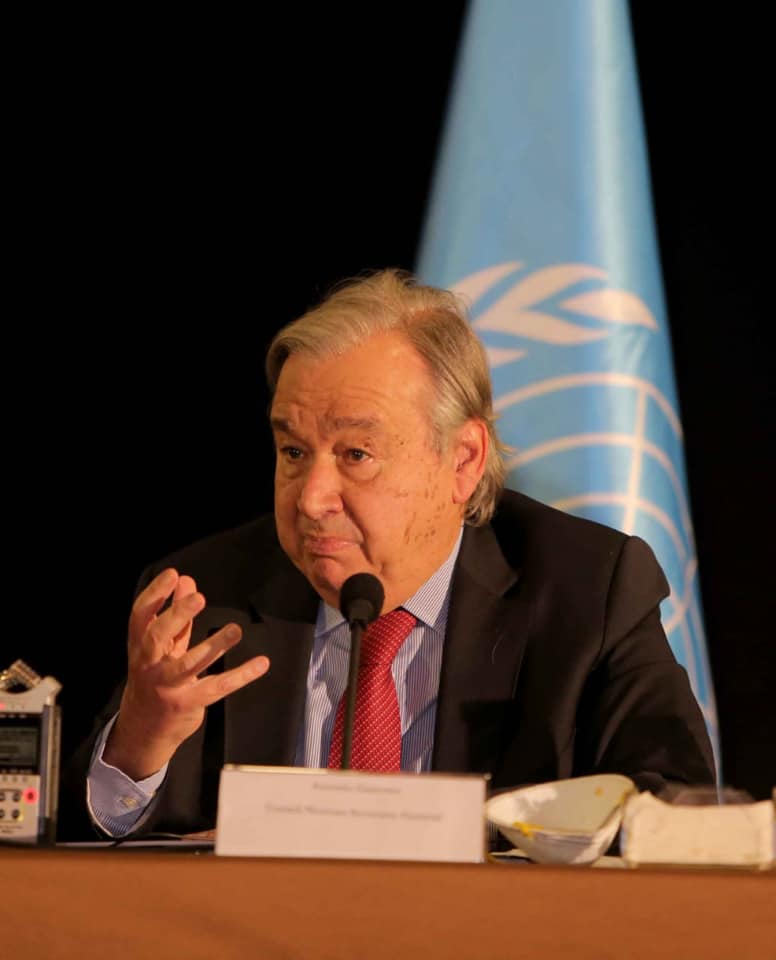
أنطونيو غوتيرس (تصوير سمير المصري)
Masdar Diplomacy
Special Coordinator Joanna Wronecka: Good evening ladies and gentlemen
Thank you for joining us this evening. It is a great honor for us to welcome the UN Secretary-General António Guterres at this press conference
Upon his arrival to Lebanon last Sunday, a country he holds very dear to his heart, the Secretary-General noted that if there is one word to characterize his visit, the word is solidarity. Tonight, he concludes a very eventful visit that included wide-ranging engagements in Lebanon with diverse sections of the society, as well as field trips to the North and to the South. We have the opportunity to hear from the Secretary-General his main takeaways and impressions from a timely and constructive visi
Following his opening remarks, the Secretary-General will be happy to take some questions
It is my honor, Secretary-General; please, you have the floor
Secretary-General: A very good evening to all of you and thank you very much for your presence, ladies and gentlemen of the media
I thank President Michel Aoun, Speaker of Parliament Nabih Berri, Prime Minister Najib Mikati, the Government of Lebanon and the Lebanese people for their warm welcome
I am grateful, not only for the possibility to engage with the political and military authorities in important discussions about the future of Lebanon, but also with the religious leaders, several groups of representatives of civil society, women activists and youth
It has been an honour for me to visit Lebanon once again
But it grieves me to see the people of this beautiful country suffering so much
The people of Lebanon face immense challenges
Yet, despite the strains they endure, the warmth and generosity of the Lebanese people continues to shine
The region and the world remain thankful for Lebanon’s generosity in giving refuge to people fleeing violent conflict abroad
I first witnessed this as High Commissioner for Refugees and I felt it again these past two days in conversations with Lebanese people from all walks of life
I commend Lebanon’s spirit of co-existence and tolerance
While here, I visited the Beirut Port
My thoughts are with the victims of the devastating blast that took the precious lives of more than 200 people – parents, daughters, sons, friends and colleagues from over a dozen countries
The United Nations mourns with you. Two children of UN staff members were among the youngest victims
The Lebanese people and the families of all the victims deserve answers and justice that can only be met through impartial, thorough and transparent investigation
I am also gravely concerned about the impact of the economic and financial crisis in the country, causing ever more people to need humanitarian assistance
Yesterday, I visited Tripoli in north Lebanon and today, Tyre in the south. I was very moved when listening to first-hand testimonies of how this crisis is impacting people’s daily lives
People expect their political leaders to listen to their needs and to restore the economy, including through a functioning government and state institutions, and by effectively fighting corruption
These past two days, I have urged Lebanon’s political leaders to work to implement reforms that respond to the demands of the Lebanese people for greater welfare, accountability, protection and transparency in order to restore hope for a better future
I have underlined the need to allow for the swift start of the formal negotiations to finalize the agreement with the IMF without further impediments
Seeing the suffering of the people of Lebanon, Lebanese leaders do not have the right to be divided and paralyze the country
All government institutions are measured on results: social protection, access to electricity and water, education and basic healthcare, good governance and the protection of human rights
In charting a path towards sustainable recovery, civil society, women and young people have a critical role to play
Their voices must be heard and their proposals seriously considered.
Free and fair parliamentary elections, held on time in 2022, will be an essential opportunity for the people to make their voices heard.
The announcement of the president of the republic after our meeting that the elections will be held in early May, confirmed in my meetings with the prime minister and the president of the parliament, represent an important guarantee that the constitution will be respected
The meaningful participation of women will be essential
As part of our commitment to Lebanon’s stability, I visited UNIFIL in southern Lebanon
Commitment to the full implementation of Resolution 1701 and maintaining the cessation of hostilities across the Blue Line and decreasing tensions between the parties is crucial
The rockets fired from Lebanese territory and the responses from Israel earlier this year are reminders of the dangers to international peace and security
A miscalculation or misunderstanding could have profound consequences. Violations are also unacceptable
UNIFIL also needs full and unimpeded access throughout its area of operations
I take this opportunity to salute the thousands of women and men peacekeepers who are far from their families and countries serving peace in Lebanon
I would like to stress that continued international support to the Lebanese Armed Forces is essential for the stability of Lebanon
I encourage all Member States to continue and more important to increase that support
The United Nations, with the international community, including through the International Support Group, remains committed to helping promote a sustainable recovery and an inclusive and dignified future for Lebanon and its people in full respect of human rights
The international community must be ready to substantially increase its solidarity with Lebanon in the implementation of the needed reforms to stabilize the economy and address the basic needs of the Lebanese people
Let’s not forget that the UN humanitarian response plan is only 11% funded despite the dramatic situation of the Lebanese people and the Lebanese economy
Let me close by once again asking the political leaders to work together to resolve this crisis – and the international community to come forward, strengthening its support for Lebanon
Thank you
Moderator: Thank you Mr. Secretary-General. Ladies and gentlemen, we will now open the floor for Q&As. We will have only one question per person to allow as many people as possible to ask questions. Please raise your hand, and if you take the floor, please say your name and the name of the media organization you belong to. Thank you.
Question in Arabic: Marlene Khalife
Secretary-General: Just a moment, because I am having problems here.
Question in Arabic: The United Nations has co-chaired multiple conferences with donor countries to support the Lebanese people, at the invitation of France. Are the UN and France preparing for any new conference, especially as France will preside the Security Council starting the new year?
Secretary-General: We have a number of initiatives prepared, but we, – can you hear me?
This was about the possibility of organizing a conference. So, we have a number of initiatives prepared and we will be ready, and we have been in contact with different Member States to organize a strong mobilization of the international community, including the possibility of a conference with a strong mobilization of the international community.
But the international community will probably not, independently of the support that has been provided, will not be responding as we need to respond if they see the country paralyzed, and if they do not see a number of clear reforms, in relation to the economic, the social and the political life of the country, guaranteeing that Lebanese institutions are putting the country on the right track, fighting corruption, respecting human rights, and presenting a credible economic recovery plan, in which, of course, the negotiations with the International Monetary Fund are essential.
We need the support of the international community to be much larger than what it is today. And Lebanon, the Lebanese people deserve it. But there is a homework that must be done in Lebanon, and that homework is essential for the credibility of Lebanon, in order to make sure that we are successful in mobilizing the support of the international community.
Question in Arabic: Your Excellency, you expressed in your statement your keenness on Lebanon’s security and safety. What Lebanon is currently experiencing is violations by the Israeli entity that still occupies large swathes of Lebanese territory and violates Resolution 1701, which, under your supervision, you work to implement and enforce so that it serves at least as a security process between Lebanon and occupied Palestine. Can the UN, or is it really working to pressure the Israeli entity to stop its land, maritime and aerial violations and the use of Lebanese airspace to attack brotherly Arab countries?
Secretary-General: First of all, all violations are unacceptable, as I said in my intervention. And on the other hand, we are totally committed, as we know where the origin of the problem is, we are totally committed to the two-state solution in Palestine and Israel.
We are totally committed for a Palestinian state, created and recognized in line with resolutions of the General Assembly and the Security Council, and living in peace and security with the State of Israel, and with, obviously, the guarantee that the integrity of Lebanon will be entirely respected.
Question: Thank you from CCTV, Chinese national television. Two questions is okay, yes? I have been in Beirut for two months. Every day, we are talking about the economic crisis and the political disputes. So, what do you think the future of Lebanon, and how can we achieve unity here in a country so divided
And another question is about China. You will go to Beijing to participate in the opening ceremony of the Olympic Games. So, some countries boycott the Olympics diplomatically, so what do you think of the relationship between sports and politics? Thank you.
Secretary-General: Well, the economic crisis in Lebanon is today extremely deep. With the collapse of large sectors of the economy and the financial sector, with the dramatic situation of people that see their savings, and cannot get them, savings of a full life of work. When the jobs [are] disappearing in large numbers. When for the first time, I believe in Lebanon, problems of nutrition existing, we are facing a very, very dramatic situation
That is why it is so important to restart negotiations with the International Monetary Fund and to establish a credible plan of economic recovery, able to mobilize the support of the international community. But that requires, of course, political will to solve.
Second, I received an invitation of the International Olympic Committee, and I accepted that invitation. Of course, every country will do whatever every country decides. It’s not for me to take position in relation to what other countries will do. I do what I believe I should do in my position of Secretary-General of the United Nations.
Question in Arabic: What will the UN offer in terms of support to Lebanon during the upcoming elections to ensure that they are held on time?
Secretary-General: First of all, the elections need to be convened, and I got guarantees that it will happen. And, the United Nations has the capacity to provide technical support, and that technical support will be provided. Our aim, naturally, is that we will do it in the perspective of the organization of free and fair elections, with adequate opportunities, the same for all those that will dispute these elections
Question: Annamaria Ohan, EFE, the Spanish news agency. After listening to testimonies of Lebanese people and, overall, your visit, do you think there must be an international investigation regarding the Beirut Port explosion for it to be as transparent as possible?
Secretary-General: Well, there is an investigation taking part, and I am a strong supporter of the separation of powers. I would not take any initiative to put into question what is being done, but obviously, I believe that it is necessary to have an investigation that is fully independent, impartial and transparent. And I hope that this will be the case in the Lebanese context. And of course, if that will not be the case in the Lebanese context, I believe that it will be important for the international community to act; [that] requires, of course, mechanisms of decision that go far beyond my own competence
Question in Arabic: Are there any updates with regards to the revision of the role of UNIFIL that you had asked for upon the latest extension of UNIFIL’s mandate last August, in terms of UNIFIL’s field work and cooperation with the Lebanese Armed Forces
Secretary-General: I only believe in reviewing mandates in order to improve them. So, if there is any intention to improve the mandate, of course, we’ll be very much open to consider it. But I would not be interested in any revision of the mandate to make it worse than what it is today. So, our job is not to change our mandate; that belongs to the Security Council. Our job is to act according to our mandate with the impartiality that characterizes the United Nations. And at the same time, in a moment like this, I think that UNIFIL has the duty and I believe UNIFIL is doing it, to express its solidarity with the Lebanese people and in its area of [operation], to support the Lebanese people and also, with the decision that the Security Council has authorized to support with different kinds of fuel, food and medicines and other aspects, the Lebanese Armed Forces, with which UNIFIL, as you know, cooperates entirely. The UNIFIL works in close cooperation with the Lebanese Armed Forces. And that should not be changed.
Question in Arabic: Will the Lebanese health sector benefits from any sort of assistance from the UN amid the current political, economic and sanitary crisis? And if that’s the case, how would this assistance be implemented and through which mechanism? Thank you.
Secretary-General: The UN has mobilized all its agencies, especially in the context of the COVID, to fully support Lebanon, and I believe that UNICEF and WHO have been very active in relation to support of the vaccination process, in relation to the provision of different equipment, in relation to cooperation with different entities of the civil society involved in this sector, and in providing technical assistance to the official departments that are responsible for health in Lebanon. We are totally committed to support the Lebanese people in these very difficult circumstances, in which increased poverty is added to a newly spreading COVID-19
Question: Mariam Saleh, Press TV. First of all, I would like to say that people of Lebanon highly value the role, the pivotal role of the UNIFIL that have been among us, of course for decades. Another issue is that the economic crisis in Lebanon is partially due to the presence of a very high number of refugees in Lebanon. And a daily question that is on the minds of the Lebanese is that the funding of the Syrian refugees in Lebanon is what is stopping them from going back to their home country. What can you tell us about this?
Secretary-General: Well, first of all, I am very grateful to the Lebanese people for the way Lebanon has opened its doors, its borders, its hearts to Syrian refugees, when so many rich countries in the world have closed theirs. On the other hand, I was, as High Commissioner for Refugees, responsible for the support to Syrian refugees. Now, we believe that independently of that support, and let’s not forget that Syrian refugees, 90 per cent are in a situation of extreme poverty. Now, the emergency response plan of the UN is addressed to the Lebanese people themselves, because the Lebanese people themselves [are] now having dramatic humanitarian needs. So, I don’t think that we should, in the present moment, only consider refugees. I think it’s the Lebanese people that is in the center of our concerns. I do not think that it is because of the meager, very meager support that we provide to Syrian refugees in Lebanon, that they do not go to Syria. I think it’s because the situation in Syria is still far from giving the guarantees that the refugees themselves feel necessary, but of course, any Syrian refugee that wants to go back to [Syria] will be supported by us.
Question in Arabic: Al Jazeera. Your Excellency, you mentioned yesterday efforts to facilitate the maritime border delineation negotiations between Lebanon and Israel. What are the steps that the UN can take in this regard and where is the stumbling block in the negotiations in your view?
Secretary-General: These negotiations are taking place between Israel and Lebanon, with the mediation of the United States. So, the UN has not a direct role in the mediation. The mediation is done by the United States. Of course, it takes place in UNIFIL, in Naqoura, in UNIFIL. But, we are hosts, we are not actors. And obviously, the difficulties are related to the delimitation. That, of course, is the limitation in which the two countries have not yet agreed. I think it’s very important that these negotiations move quickly, because we are discussing areas with rich natural resources. And for the Lebanese economy, those rich natural resources will be very important. And so, I think it is in the interest of everybody to move quickly with these negotiations and to come quickly to a result. From all sides, we’ll do anything that we are required in order to support that process.
Question: Nabil Abi Saab, Alaraby TV station. Mr. Secretary-General, did you raise the issue of the eastern border of Lebanon in this visit? Did you discuss the situation on the eastern border between Lebanon and Syria? Because, as we read in your periodic reports, that these borders are not under the control of the Lebanese army in some parts of it. So, what do you think about the eastern borders? What should be done? For the State of Lebanon and, to stabilize maybe, or to have better control of these borders?
Secretary-General: It was not an area that was discussed in depth. We mentioned several difficult situations in that border. I remember, when I was High Commissioner for Refugees, there was an area, let me see […] Aarsal, that I visited, where there was infiltration of several groups from the Syrian area and where the Lebanese Armed Forces were asked to come and to protect the population. And in my opinion, it is essential that the Lebanese Armed Forces are able to control all the borders of the country.
Moderator: With no further questions, thank you, Mr. Secretary-General, for your presence. Merci beaucoup. Shukran.
